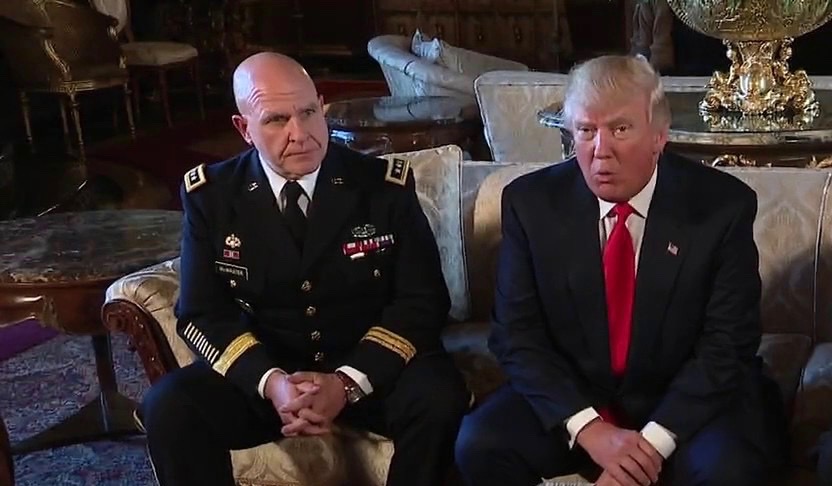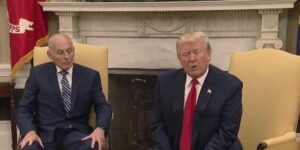 President Donald Trump named retired Marine Gen. Jim Mattis as Defense Secretary, the highest-ranking civilian position in the Pentagon. Retired Marine Gen. John Kelly was named first to head the Homeland Security Department and then replaced Reince Priebus as White House Chief of Staff.
President Donald Trump named retired Marine Gen. Jim Mattis as Defense Secretary, the highest-ranking civilian position in the Pentagon. Retired Marine Gen. John Kelly was named first to head the Homeland Security Department and then replaced Reince Priebus as White House Chief of Staff.
Army Lt. Gen. H.R. McMaster replaced Air Force Gen. Mike Flynn as the Trump Administration’s National Security Advisor. And Attorney General Jeff Sessions has nominated Army Maj. Gen. Mark Inch to head the Bureau of Prisons. If approved, as he likely will be, there will be four military generals serving in top positions normally held by civilians. Relatively speaking, that’s a lot.

Joan Johnson-Freese
Several key National Security Council positions are going to retired military officers as well. Questions have already been raised about whether too many generals and overall military influence risks tipping the delicate civil-military relations balance that has kept America strong. Beyond that, while each of these individuals undoubtedly brings tremendous experience to their positions, it must also be asked whether they are bringing the right job skills and cultural dispositions to their positions. Nobody argues that retired ambassadors, because they have demonstrated career achievement should, on retirement, be hired by the military, given a few stars and perhaps act as a Service Chief or the Joint Chief of Staff. They simply do not have the job skills to do so. Yet retired military officers (and now active duty officers) are frequently assumed to be able to step into positions very different than their job skills – and professional culture – likely have prepared them for.

Gen. Kelly and President Trump
Military officers work their way up the promotion system largely based on their skill in tactical areas. Flying planes, driving and operating ships, and operating in the complex world of irregular warfare takes skills primarily learned through training. Additionally, members of the military generally, and officers specifically, are also provided progressive and sequential training in leadership, including being held to high levels of responsibility and authority at low levels of the organization. This produces a “take charge” attitude toward getting a mission accomplished. When someone is told to “take that hill” they are not, however, encouraged to ask “why,” “what are the larger strategic implications,” or “what might be the unintended consequences six months from now.” The ‘get it done” approach is effective at tactical levels and assumed to translate to a jack-of-all trades capability to get things done, regardless of the job.
That assumption of capability regardless of the job can be and often is, however, overstated, especially when extended beyond the tactical level or to a different environment. Military officers coming directly from operational jobs are, for example, often not the best fit for academic teaching in subjects beyond their expertise at professional military educations institutions. Good pilots do not necessarily make good teachers of subjects like international relations. As Iraq and Afghanistan have demonstrated, regardless of the leader, the best the military can do is create a security environment potentially conducive to democracy; it cannot democratize a country.
Assuming that because military officers have run military staffs they then can run any large staff ignores the differences between hierarchical military staffs and bureaucratic civilian staffs, as running the latter has sometimes been described as “herding cats.” Though retired general and President Dwight Eisenhower is considered to have been particularly adept at handling a large military staff, he found dealing with civilian bureaucrats – including those who sometimes undercut him – very different and more difficult. Military leaders expect obedience. Gen. Kelly jokingly suggesting to President Trump that he use the sword presented to him at the Coast Guard Academy on the seemingly disobedient press illustrates this expectation.
Civilian institutions are different than military institutions and not all military officers adapt well to the cultural differences. Different people excel at different jobs, military or civilian. Gen. David Petraeus went from being the “rock star” general with a Princeton Ph.D. to resignation and disgrace as CIA Director, where he encountered a very different and less differential culture. Given that he completed his Ph.D. in residence at Princeton, Petraeus had more exposure to the expectations of the civilian world than most career military officers, as most get their post-enlistment education through Professional Military Education (PME).
While individuals can certainly learn geopolitics and strategic thinking skills, that is the area of least emphasis in PME. By law (Goldwater-Nichols), military officers are required to complete Joint Profession Military Education I and II. The vast majority does so by distance education. Those who attend a 10-month in-residence program find vastly different curricula, faculty and methodologies used by the Army, Navy, Air Force, Marines and the National Defense University, with varying levels of attention paid to operations and doctrine rather than strategic and critical thinking. Defense Secretary Jim Mattis has recently called for redirecting military education more to the art and science of warfighting, as opposed to subjects not directly related to military officers jobs. That could, in effect, narrow rather than broaden attention to geopolitics and strategic thinking.
Finally, it is popular to assume that military leaders are inherently more trustworthy and honest than their civilian political counterparts who make up “The Swamp” that President Trump has vowed to drain. Yet Petraeus’ demise was largely about lying to the FBI. Retired Army Lt. Gen. Michael Flynn lasted only three weeks as National Security Advisor, after lying about foreign contacts. The number of military officers being dismissed over the past years has raised concern within the military itself. According to a Navy spokesman, poor leadership, bad judgment, and ethical lapses, rather than operational failures, are increasingly factors in the firings.
Regarding the point on operational failures though, military analyst Tom Ricks contends that, “relief of generals has become so rare that a private who loses his rifle is now punished more than a general who loses his part of the war.” That lack of accountability for performance perpetuates both an overestimation of capabilities and inflated egos with a sense of impunity.
True, there is a long tradition of bringing individuals with military experience into government roles. Their experience and their views on strategic options are a necessary, and at times undervalued source of information for civilian leadership. When Army Gen. Eric Shinseki provided what turned out to be spot-on estimates of troops needed for post-hostility control of Iraq, he was berated and retired. But hiring so many generals and retired officers, so quickly, and – focusing on Mattis, McMaster and Kelly as the orchestra leader for White House agenda-setting within a concentrated area of security/defense, could be a problem. Strategist Carl von Clauswitz famously stated, “war is the continuation of politics by other means.” Whether all “other means” are being considered by such a group of potentially like-minds individuals deserves critical consideration.
Joan Johnson-Freese, a member of the Breaking Defense Board of Contributors, authored the recently released Space Warfare in the 21st Century: Arming the Heavens. She is a professor of national security affairs at the Naval War College. The views presented are those of the author alone and do not represent the US government, the Defense Department or the US Navy.
Air Force picks Anduril, General Atomics for next round of CCA work
The two vendors emerged successful from an original pool of five and are expected to carry their drone designs through a prototyping phase that will build and test aircraft.


























